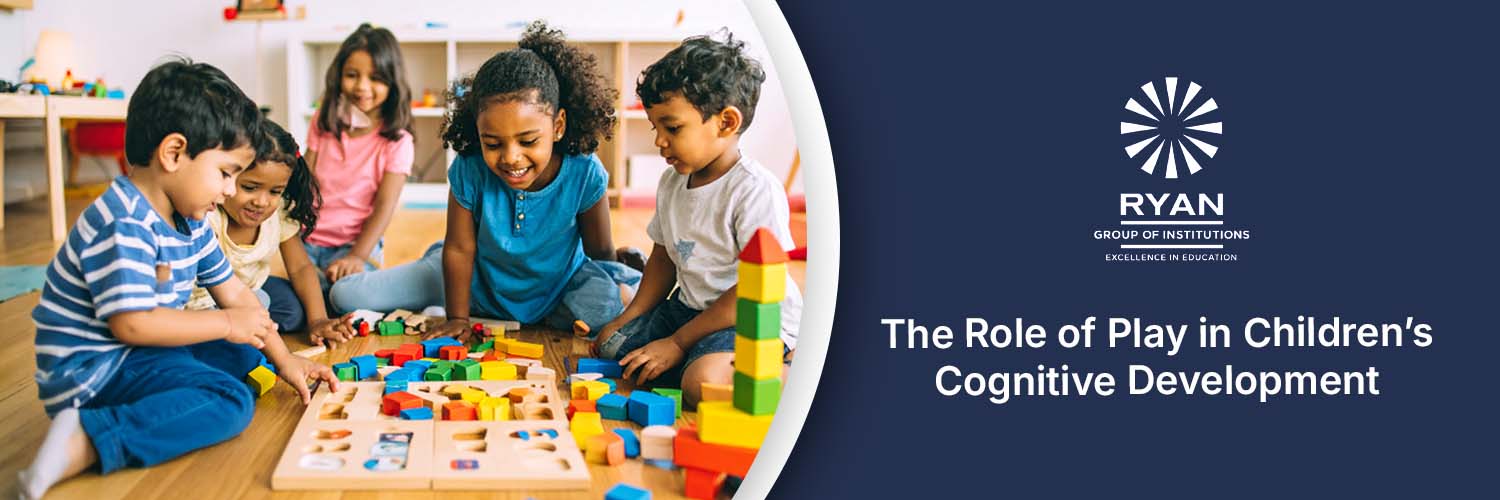As Indian parents, our children’s education is one of our most important priorities. The competition in all fields is very high. To achieve an excellent academic outcome, we often start imbibing in our kids the idea of long hours of study from early on. In the quest for “good scores”, we divide the children’s after-school hours to accommodate homework, tuitions, extra coaching classes, and structured learning. These activities indeed help children’s learning.
However, we often overlook an important tool of learning and development: PLAY!
Most Indian parents often believe that playing is a waste of time and that their kid can score well if he uses that time for studying. But, playing games has proven to be essential for the cognitive and emotional development of children. This blog explains the role of play in children’s cognitive development.
What is Cognitive Development?
The Merriam-Webster dictionary lists the meaning of the word “Cognitive” as “relating to, being, or involving conscious intellectual activity. Cognitive development refers to the development of a child’s ability to think, explore, remember, solve problems, and use language. Children perceive the world, make decisions, and process information based on their cognitive development.
Scientific studies have also confirmed that playing games plays a significant role in children’s cognitive development.
Types of Play and How they Help
Children play various types of games. Each helps in the development of one or more cognitive abilities and social skills.
- Pretend play (Imaginative play)
This is when children pretend as a teacher, fireman, doctor, or their favourite superhero! Pretend play is not just adorable but is also great for brain development. It helps in improving creativity, vocabulary, and observation skills. It also strengthens the executive functions, which include planning a task and focusing on it.
- Constructive play
This includes using building towers with blocks, assembling puzzle pieces, moulding clay and playdough. These activities help in developing fine motor skills, logical thinking and the awareness of space.
- Physical play
Physical play refers to the outdoor games such as running, jumping, climbing, etc. Physical play offers the much-needed exercise to the body, enabling its growth. It improves coordination, balance, and strength. Physical play also improves the flow of oxygen to the brain, thus enabling better brain health also. Physical play often involves team sports such as cricket, football and basketball. Playing these games develop team spirit and social skills.
- Rules-based games and Board games
Chess, carrom, ludo, and business are some examples of rules-based board games. Children learn to follow rules, take turns, and deal with winning and losing. This, in turn, helps in social cognition development and emotional regulation. Children learn to negotiate, cooperate and understand other perspectives.
- Free Play
This is when children are allowed to play freely, without any instructions or objectives. It develops curiosity and gives children a safe space explore, fail, and try again. Free play is an essential element in the development of independent thinking and decision-making.
What does Science say?
Many researchers around the world have studied the effects of play on children’s cognitive development. They all strongly agree that play is essential for cognitive, social and emotional development of children. University of Delta Journal of Contemporary Studies in Education published a study in 2023 that concluded that play improves decision-making, executive functioning, creativity, imagination, language and literacy development, and problem-solving abilities. This study also highlighted that parents, educators, legislators, and society
will benefit significantly from understanding the importance of play.
Include play in your child’s daily routine
Many children today spend less time playing outside than earlier generations. This is due to the limited availability of open spaces and the increasing screen time. It is a common sight in Indian households where children are glued to either mobile phones or TV, watching content for long hours. This trend has serious implications, such as reduced attention spans, increased anxiety, and underdeveloped social skills.
As parents, we can make some conscious choices:
- Prioritise playtime just as much as study time
- Cut down on screen time. It’s ok for the child to get bored sometimes. It leads to imaginative play
- Avoid cramming the child’s schedule with too many classes or activities.
- Encourage outdoor play with other kids around the neighbourhood
- Join them in their play. This helps to strengthen your emotional bond with them
How Schools Can Support Play
Many progressive Indian schools are recognising the role of play in learning and have started incorporating it into their curriculum through:
- Activity-based learning
- Montessori-inspired methods
- Highly qualified sports teachers
- Active coaching and encouragement to participate in tournaments
Ryan Schools, for example, uses this approach and encourages active play so that children enjoy the benefits of play and academics in a balanced manner.
As parents, we need to understand that play is not a distraction from learning. it is indeed a critical part of learning. It teaches children how to think, how to feel, and how to connect. As our children grow in a fast-paced, competitive world, we must protect their right to play as it holds a crucial key to their cognitive development: the fundamental building block of their success in all walks of life.




